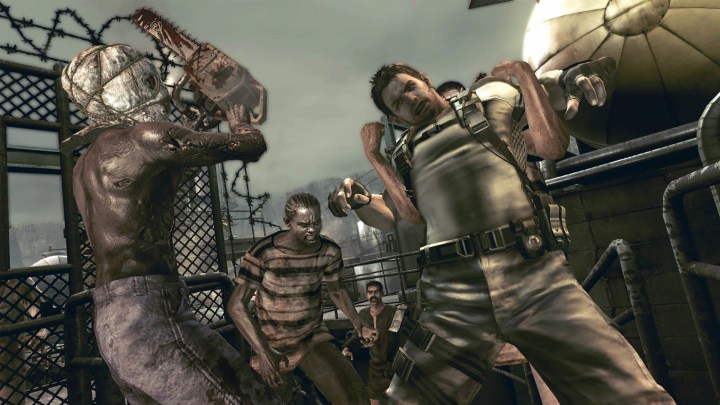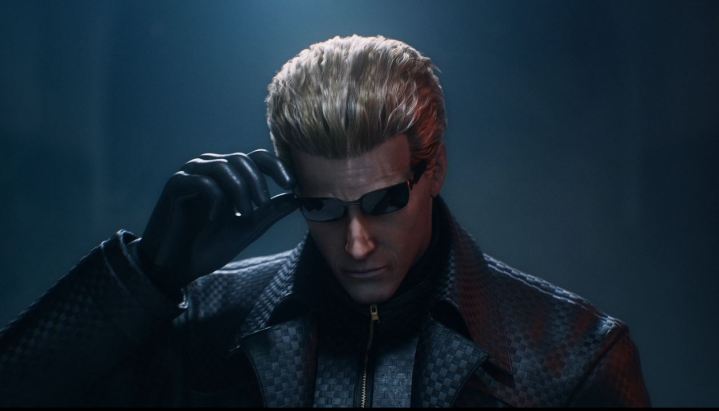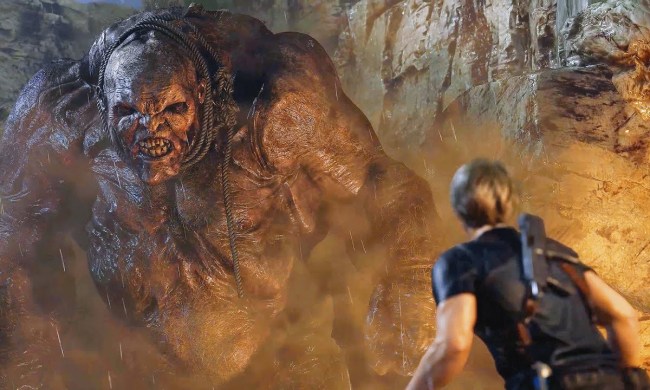When Capcom released its Resident Evil 3 remake in 2020, I was filled with dread knowing Resident Evil 4 was next. Capcom had proven it could modernize a survival horror game with Resident Evil 2, but I was skeptical that the same framework would work with a pure action game. Thankfully, I was wrong and the newly released Resident Evil 4 remake is one of the series’ finest games yet. With that smashing success, one might assume that Resident Evil 5 is next in line for a touch-up.
But I truly hope it isn’t.
While I’ve been very wrong before, there’s a much stronger case for leaving one of the series’ most divisive entries in the past. Some of those reasons will be obvious to anyone who’s played the original or is familiar with the discourse around it. Beyond that, though, Resident Evil 5’s narrative doesn’t actually fit into Capcom’s current remake storyline. It’s very selective approach has entirely worked around one of the series’ biggest villains, making it clear that its current string of releases isn’t building to the same climax.
An uncomfortable installment
Let’s get the obvious reason out of the way first. Resident Evil 5 was an incredibly controversial game when it launched in 2009 due to its story and setting. In an attempt to capitalize on Resident Evil 4, which took the series to a remote Spanish town, Capcom decided to expand on the “international” direction of the series. It would do that by sending Chris Redfield to West Africa to stop a terrorism threat.
That would create an uncomfortable premise that saw Redfield, and his partner Sheva Alomar, storming through villages and killing waves of parasite-ridden Africans, most of which were Black. With some calling out the poor-taste racial implications of that idea, the game would draw criticism before it even launched. The final product would only make that worse. A large part of Resident Evil 5 would see Redfield and Alomar killing “tribal” African monsters, largely based on racial stereotypes — a spear-wielding enemy type would specifically set off alarm bells.

A remake of Resident Evil 5 would have no choice but to revisit that controversy, as there’s no real way to work around them without an entire rewrite. Judging by comments from Capcom, it doesn’t seem like the publisher is going to want to rock that boat again. In a 2010 interview with Gamasutra (now Game Developer), Capcom senior PR manager Melody Pfeiffer addressed the controversy and noted how it impacted the way Resident Evil games are made.
“Since the RE5 controversy, we have become much more aware of how important it is that we are part of the asset creation process early on so that we are able to have a say in the end product,” Pfeiffer said. “We are also designing a lot of our own assets from this side of the pond so that we are able to make strategic pieces of content that make sense for our market. We are working really closely with our producers in Japan to construct these materials for the West and they are open more than ever to hearing our thoughts and ideas for assets.”
If the game drew such heavy criticism in 2009, one can only imagine what the reaction to it would be in a more socially conscious 2023. It’s hard to imagine that Capcom would want to reopen that wound, especially for a game that’s not nearly as celebrated as the previous ones it’s remade. Considering that Resident Evil 5 is a fairly modern game that’s easily available on new platforms via a remastered edition, a full remake seems like a needless risk for Capcom.
And looking at the publisher’ careful remake approach, it seems like the project has never been in the cards.
The Wesker saga
The Resident Evil series has one of the deepest and most complicated narratives in all of video games. It’s filled with lore, telling a sprawling story filled with corporate corruption, government intrigue, and complicated characters that have radically changed over decades. If you just try to play each mainline game in sequence, you’ll only get a small fraction of that story. Key details are housed in CGI films and obscure spin-offs (a major plot beat setting up Resident Evil 4 happens in a Wii light gun game).
While Capcom has remade three big mainline games, it hasn’t actually touched anything that leads into Resident Evil 5. That’s mostly because the latter’s story is all about one of the franchise’s most important villains: Albert Wesker. The virologist-turned-terrorist has a complex storyline that weaves in and out of various games. He plays a crucial role in the first Resident Evil, with a shocking betrayal setting him up as a primary human antagonist, but he’d largely lurk in the shadows before becoming the main villain of Resident Evil 5.
Oddly enough, Wesker isn’t a major player in any of the Resident Evil games Capcom has remade so far. He cameos here and there, establishing his working relationship with Ada Wong, but his story doesn’t actually play out in any of those games. Instead, his core moments happen in Resident Evil 0, Resident Evil, and Resident Evil Code: Veronica — the exact three mainline games that Capcom has yet to remake.

In some cases, the publisher has almost gone out of its way to downplay Wesker’s involvement in the games it has touched. While Wesker cameos in Resident Evil 4, the bulk of his story happens in a DLC called Separate Ways that wasn’t remade along with the original game. Similarly, none of the new remakes have come bundled with Wesker’s Report, a pair of short films created to explain the character’s backstory. Both were previously included in a Japanese remaster of the first Resident Evil.
If Capcom were to jump straight into Resident Evil 5 next, its story would be somewhat incomprehensible to new players. It would essentially introduce an entirely new villain at the climax of their long-running story arc. You can’t really have a modern version of Resident Evil 5 without revisiting the first game and Code: Veronica at the very least. With those untouched, it very much feels like the publisher is working around that saga entirely to focus on its core conflicts.
Between its racial problems and the current state of the remake storyline, Resident Evil 5 would be a much more complicated project for Capcom than any previous remake. It would require a total narrative overhaul, one that would almost make it an entirely different game. At that point, why bother? Resident Evil 2, 3, and 4 currently make for a neat little remake trilogy that doesn’t need the context of later releases to work. It might be time for Capcom to move on from the series’ past and fully invest in its future.



